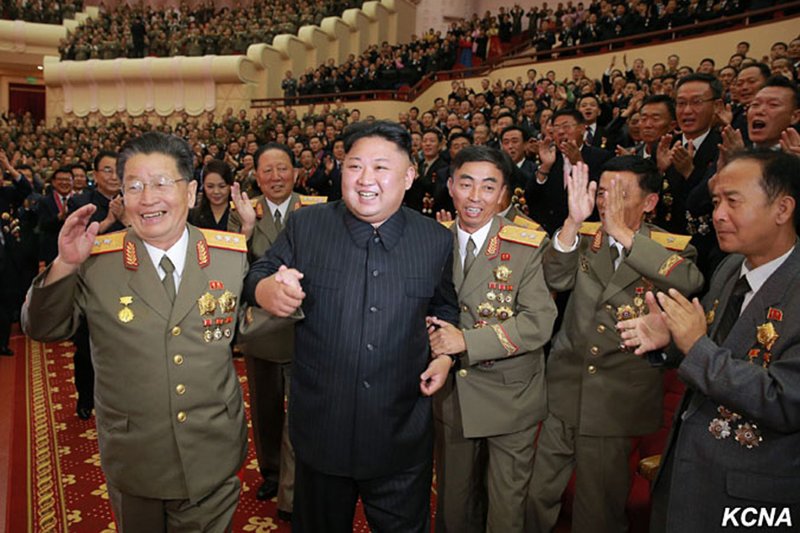North Korean leader Kim Jong Un, accompanied by his wife, Ri Sol-Ju, hosted a lavish gala at the People's Theatre in Pyongyang on Sept. 10. North Korea's provocations are increasing the probability of U.S. military options, a former CIA analyst said Thursday. Photo courtesy of KCNA/UPI |
License Photo
NEW YORK, Oct. 5 (UPI) -- North Korea's provocations are not being taken lightly in Washington, where policymakers are weighing military options despite the potentially catastrophic consequences.
Speaking at a public roundtable at The Korea Society in New York on Thursday, Bruce Klingner, a former CIA deputy division chief for Korea, said he's hearing "military options are increasing, not decreasing" in the Trump administration.
"The probability of a military option is not zero," Klingner said, adding there is talk "inside government" of the "five options to solve North Korea in 18 months."
While not elaborating on those options, the analyst said he is concerned North Korea could conduct a test of an intercontinental ballistic missile that could fly farther than the projectile launched July 4.
"I'm pretty sure they're going to do an ICBM test," Klingner said.
An unprecedented provocation could set the wheels in motion at the Pentagon to take more forceful measures.
Analysts in South Korea and the United States have also said North Korea's threat to test a hydrogen bomb in the Pacific Ocean is credible because North Korea has frequently followed through with verbal provocations.
But Klingner said a "nuclear airburst" is "over the top" and unlikely.
Predicting North Korea's next move has always been somewhat of a guessing game, and leader Kim Jong Un does not make life easier for policymakers or intelligence analysts.
Sue Mi Terry, a former CIA analyst, described Kim as "very calculating, very shrewd," as he plays his cards against the United States.
"He is not irrational. Kim wants to survive," Terry said. "His goal is to live a long time."
The analyst said Kim's cleverness showed in his decision to fly missiles over Japan, following sinister threats to lay siege to Guam.
"The decision to fly a missile over Japan was very carefully calibrated," Terry said. "It's not too much so that it compels the [United States] to act but it's still a little bit more."
North Korea's provocations have died down but expectations are rising that more tests could take place when Pyongyang celebrates a Workers' Party anniversary in October.
North Korea has not taken additional military measures since U.S. President Donald Trump condemned Kim and called the North Korean leader a "rocket man on a suicide mission."
Klingner said Trump's remarks before the United Nations General Assembly, though "unhelpful," was a response to North Korea aggression and not a pledge to initiate an attack.
"I think if you get beyond Rocket Man and 'we will destroy North Korea,' I think the context of the vow, the pledge or the threat, was in the context of responding to a North Korean attack," Klingner said.
Weeks before the U.N. convened in New York, North Korea conducted its sixth nuclear test and launched its second missile over the Japanese island of Hokkaido.
Terry said Trump's remarks, including his statement to "totally destroy North Korea," pose a long-term problem for U.S. policymakers.
"When you are making these threats, at some point I do think we are boxing ourselves in," Terry said. "Because what if North Koreans continue [provocations], and they probably will."
"Then are we really going to act, because we said we will? Because if we don't we lose credibility. We are forced into a position where we have to act," she added. "It's unhelpful. We look like a paper tiger."
Terry also ruled out recognizing North Korea as a nuclear weapons state, a demand Pyongyang has been seeking in informal talks with former U.S. officials, including Terry and Klingner, who both met North Korean diplomats in Stockholm in July.
Once recognized as a nuclear weapons state, North Korea could "resort to nuclear blackmail, kick out U.S. forces on the peninsula, and bank on the United States not to come to the aid of Seoul," Terry said. "Why risk San Francisco for Seoul?"















